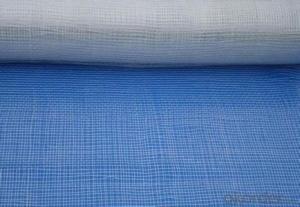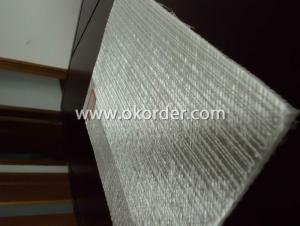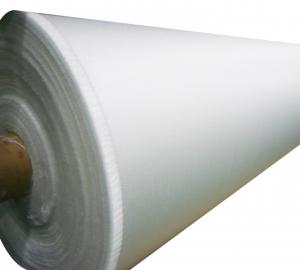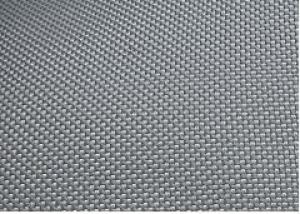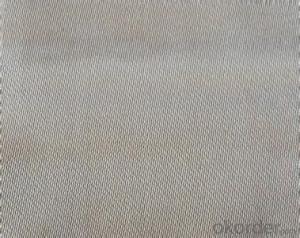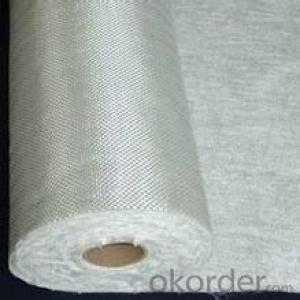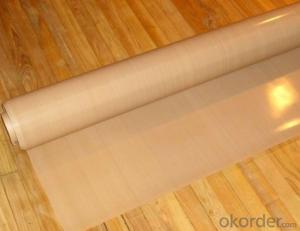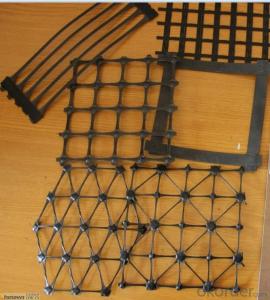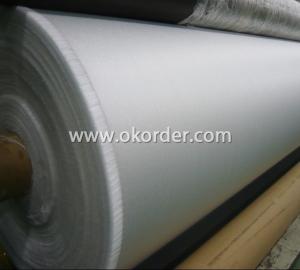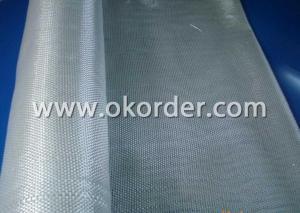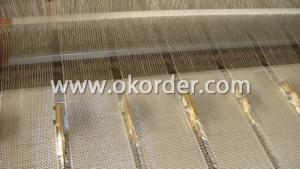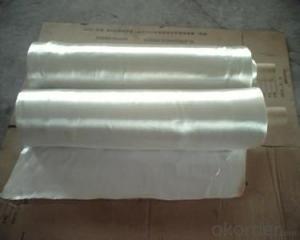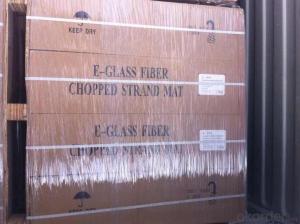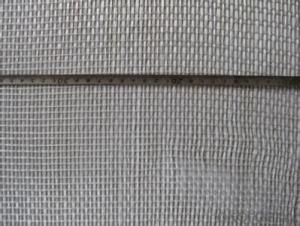High Silica Glass Fiber Cloth Fabric
- Loading Port:
- China Main Port
- Payment Terms:
- TT OR LC
- Min Order Qty:
- -
- Supply Capability:
- -
OKorder Service Pledge
Quality Product, Order Online Tracking, Timely Delivery
OKorder Financial Service
Credit Rating, Credit Services, Credit Purchasing
You Might Also Like
Quick Details
| Place of Origin: | Brand Name: | Model Number: | |||
| Application: | Weight: | Surface Treatment: | |||
| Width: | Weave Type: | Yarn Type: | |||
| Alkali Content: | Standing Temperature: |
Packaging & Delivery
| Packaging Detail: | 50m/carton |
| Delivery Detail: | about 20days |
Specifications
1. High silica glass fiber cloth.
2. High temperature resistance.
3. Instant working temp.: 1400C degree
- Q:Can fiberglass fabric be used for heat-resistant gaskets?
- Yes, fiberglass fabric can be used for heat-resistant gaskets. Fiberglass fabric is known for its excellent heat resistance properties, making it a popular choice for applications that require resistance to high temperatures. It can withstand temperatures up to several hundred degrees Celsius without degrading or melting. This makes fiberglass fabric an ideal material for heat-resistant gaskets, as it can effectively seal joints and prevent heat transfer between different components. Additionally, fiberglass fabric is also resistant to chemicals, water, and abrasion, further enhancing its suitability for gasket applications.
- Q:What are the different lamination options available for fiberglass fabric?
- There are several lamination options available for fiberglass fabric, depending on the specific requirements and applications. Some of the common lamination options include: 1. Polyester Resin Lamination: This is the most commonly used lamination option for fiberglass fabric. Polyester resin is applied to the fabric, forming a strong and durable bond. It provides good chemical resistance and is suitable for applications where high strength is required. 2. Epoxy Resin Lamination: Epoxy resin lamination offers superior strength and excellent adhesion. It is often used in applications that require high-performance and resistance to harsh environmental conditions. Epoxy resin also provides good chemical and heat resistance. 3. Polyurethane Lamination: Polyurethane lamination offers flexibility and excellent abrasion resistance. It is commonly used in applications that require fabric flexibility and durability, such as inflatable structures or protective clothing. 4. Vinyl Ester Resin Lamination: Vinyl ester resin is a hybrid between polyester and epoxy resins, offering high strength and excellent corrosion resistance. It is commonly used in applications exposed to harsh chemicals or environments, such as chemical storage tanks or marine applications. 5. Thermoplastic Lamination: Thermoplastic lamination involves the use of heat and pressure to bond a thermoplastic film onto the fiberglass fabric. This option provides good chemical resistance and is often used in applications that require waterproofing or resistance to environmental elements. It is important to consider the specific requirements and intended use of the fiberglass fabric when choosing the appropriate lamination option. Factors such as strength, flexibility, chemical resistance, and environmental conditions will help determine the most suitable lamination choice.
- Q:Can fiberglass fabric be used for car covers?
- Yes, fiberglass fabric can be used for car covers. Fiberglass fabric is known for its durability and resistance to tearing, making it a suitable material for protecting cars from various external elements such as dust, dirt, and UV rays. It is also lightweight, easy to handle, and can be easily customized to fit different car sizes and shapes. Additionally, fiberglass fabric has excellent heat insulation properties, which can help protect the car's interior from extreme temperatures. However, it is important to note that fiberglass fabric on its own may not be waterproof, so it is recommended to use a waterproof coating or layer underneath the fabric for added protection against rain and moisture.
- Q:Can fiberglass fabric be used for packaging?
- Certain applications make it possible to use fiberglass fabric for packaging. The strength, durability, and resistance to heat and chemicals of fiberglass fabric are well-known, making it a suitable option for safeguarding and securing various products in transit or storage. It can effectively wrap delicate or vulnerable items, such as electronics or glassware, providing protection against impact, moisture, and dust. Furthermore, fiberglass fabric can enhance the strength and stability of packaging materials like tapes or straps when used as reinforcement. Nonetheless, it is crucial to consider the specific requirements of the packaging application and ensure that fiberglass fabric is the appropriate choice, as it may not be suitable for all products or packaging methods.
- Q:Can fiberglass fabrics be used for insulation in automotive engines?
- Fiberglass fabrics have the capability to insulate automotive engines, as they possess exceptional thermal insulation properties. This makes them suitable for situations where heat management is crucial, like in automotive engines. These fabrics demonstrate the ability to endure high temperatures without any degradation or loss of their insulating properties. They can be employed to cover various engine components, pipes, or any other areas that necessitate minimal heat transfer. Apart from their thermal insulation prowess, fiberglass fabrics also deliver additional advantages, including their lightweight nature, flexibility, and resistance to chemicals and fire. However, it is imperative to ensure proper installation and compatibility with the specific engine requirements in order to optimize the effectiveness and safety of fiberglass fabric insulation in automotive engines.
- Q:Can fiberglass fabric be used for reinforcing plaster or stucco?
- Fiberglass fabric, when used for reinforcing plaster or stucco, can significantly enhance the strength and stability of the surfaces. This durable and robust material is commonly employed in construction projects to prevent cracks and bolster the overall durability of plaster or stucco. Typically, the fiberglass fabric is applied to the surface prior to the application of plaster or stucco, ensuring an even distribution of stress and minimizing the likelihood of cracking or crumbling. Moreover, fiberglass fabric possesses resistance against both moisture and weathering, rendering it an ideal choice for exterior applications, where plaster or stucco may face harsh environmental conditions. Ultimately, the utilization of fiberglass fabric in reinforcing plaster or stucco contributes to the improved structural integrity and longevity of the final surfaces.
- Q:How about the difference between glass fiber cloth and ordinary chemical fiber cloth?
- My major is chemical fiber. It's easy to tell apart! You can burn it with a fire. It can melt and drop like a candle. (careful not to stick to your body and burn it!) It's a synthetic fabric, not a fiberglass fabric.
- Q:Can fiberglass fabric be used for insulation in breweries?
- Yes, fiberglass fabric can be used for insulation in breweries. It is a commonly used material due to its excellent thermal insulation properties, fire resistance, and durability. It helps maintain the desired temperature and prevents heat loss, making it suitable for insulating tanks, pipes, and other equipment in breweries.
- Q:How to deal with thermal cracking of exterior wall?
- Surface treatment. Construction surface layer. Usually hang wire mesh, or glass fiber cloth and so on to strengthen the network, wipe anti crack mortar, re construction of the finish layer.
- Q:Can fiberglass fabrics be used for insulation in pipelines?
- Indeed, insulation in pipelines can be achieved by employing fiberglass fabrics. The reason behind this lies in the remarkable thermal insulating properties fiberglass fabrics possess, as they proficiently obstruct the transfer of heat. By employing fiberglass fabrics as insulation in pipelines, it becomes feasible to sustain the desired temperature of the fluid being conveyed, regardless of whether it is hot or cold. Moreover, fiberglass fabrics exhibit resistance towards moisture and chemicals, rendering them apt for utilization in diverse surroundings. Alongside this, their lightweight and flexible nature permits effortless installation and upkeep. Taken together, fiberglass fabrics are widely favored for pipeline insulation owing to their capacity for thermal insulation and enduring quality.
1. Manufacturer Overview |
|
|---|---|
| Location | |
| Year Established | |
| Annual Output Value | |
| Main Markets | |
| Company Certifications | |
2. Manufacturer Certificates |
|
|---|---|
| a) Certification Name | |
| Range | |
| Reference | |
| Validity Period | |
3. Manufacturer Capability |
|
|---|---|
| a)Trade Capacity | |
| Nearest Port | |
| Export Percentage | |
| No.of Employees in Trade Department | |
| Language Spoken: | |
| b)Factory Information | |
| Factory Size: | |
| No. of Production Lines | |
| Contract Manufacturing | |
| Product Price Range | |
Send your message to us
High Silica Glass Fiber Cloth Fabric
- Loading Port:
- China Main Port
- Payment Terms:
- TT OR LC
- Min Order Qty:
- -
- Supply Capability:
- -
OKorder Service Pledge
Quality Product, Order Online Tracking, Timely Delivery
OKorder Financial Service
Credit Rating, Credit Services, Credit Purchasing
Similar products
New products
Hot products
Related keywords
